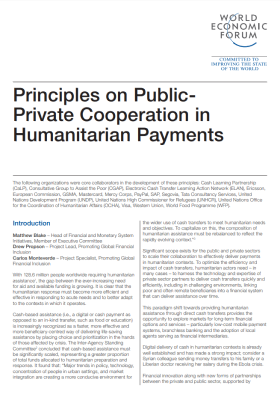Principles on Public-Private Cooperation in Humanitarian Payments
E-payments can make the delivery of cash disbursements more secure, cost- effective, faster and more convenient. In the context of humanitarian crises, digital payments offer recipients choice and can help stimulate the local economy. To fully realize the benefits of new technologies and achieve scale, guidelines on the relationship between humanitarian and private sector actors to deliver digital payments must be developed.
The report outlines six core principles for public-private cooperation in humanitarian payments. It is intended to serve as a resource for various audiences:
- Global and regional private organizations partnering to advance financial inclusion and the digitalization of humanitarian payments through multistakeholder approaches
- Humanitarian actors working to streamline assistance processes and procedures
- State leaders and stakeholders working to shape, strengthen and scale international partnerships in financial inclusion and humanitarian aid
The set of principles delineated in this document does not aim to recommend a definite set of “right answers”. The ambition is to deliver key driving principles identified by the Forum that can catalyse an efficient transition to cash based humanitarian aid and a successful multi stakeholder partnership effort within the financial inclusion agenda. It aims to be positioned as a working document, which over time can be customized and refined to attain collaborative and harmonized approaches to effective public-private cooperation in humanitarian action.



